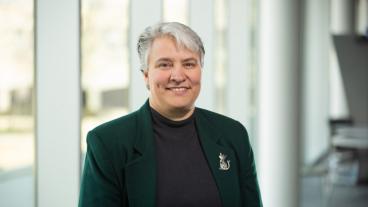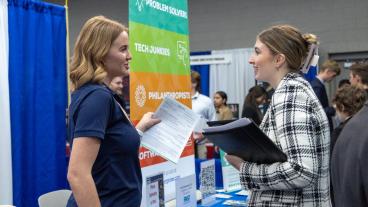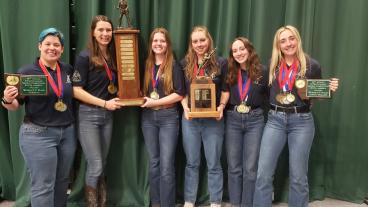In the center of a clear plastic tub, small rocks formed a mound. With sixth graders gathered around the tub, Lyndsey Wright poured cool water over the rock mound. Next she poked small holes in a paper cup, put some blue food coloring in the bottom, and set the cup in the corner of the tub. Quickly she poured hot water into the cup. And the students observed. Then they got their own tubs and supplies to reverse the experiment with warm water over the rock mound and cold water in the cup. They observed, compared and discussed the experiments.
A textbook could have provided an explanation of how mountains affect climate, but this was interactive. This was fun.
Wright is pursuing a master’s degree in applied mathematics at Mines. She is focused on a numerical method for solving Poisson’s Equation for her research project. And she also says she likes doing “nerdy lessons with kids.” Last year, funded by the NSF’s GK-12 Learning Partnerships grant, Wright worked with a middle school science and math teacher. This year, funded by the S.D. Bechtel, Jr. Foundation, she is working with a kindergarten teacher to give children an early introduction to science, technology, engineering and math (STEM).
Kelly Lundstrom is a master’s student in applied statistics. Her research is related to assessment in education, specifically with the Bechtel Initiative, and she works with Mines Professor Barbara Moskal on assessing data from the program. For the past year and a half, she worked in an elementary school classroom where one of her favorite lessons was a raisin race, teaching students that matter exists as solids, liquids and gases and can change from one state to another by heating and cooling. She also co-ran an after-school science club where students completed engineering design projects. “My favorite part was seeing how excited the students got every time I presented something cool related to STEM,” said Lundstrom.
Funded by grants from the Bechtel Foundation and the National Science Foundation (NSF), kindergarten through eighth grade teachers, Mines faculty and Mines graduate students work together to develop problem-centered, interdisciplinary learning experiences for K-8 students in Adams County District 50, Adams County District 12, Denver Public Schools and Englewood Schools. Mines leads a two-week summer workshop focused on mathematical, scientific and engineering content, as well as instructional techniques, for the teachers and graduate students. Then throughout the following school year, the graduate students provide assistance to the teachers in their classrooms.
“Every week elementary and middle school students interact with Mines students – great role models who like science and math and want to work in a STEM field,” said Moskal, who directs the Trefny Institute and the Center for Assessment of Science, Technology, Engineering and Mathematics at Mines. Her research group examines the effectiveness of existing and new STEM programs and asks: How do you capture the impact of outreach programs on students’ learning and attitudes?
One thing Moskal has learned is students want to see the usefulness of STEM subjects. They are motivated when they realize how STEM can benefit their lives and the lives of others. So practical applications are an important element of Mines’ STEM programs, which also include the Renewable Energy Materials Research Science and Engineering Center (REMRSEC) K-12 Education Outreach.
Supported by the Bechtel Foundation, BNSF Foundation, ECA Foundation, Northrup Grumman, NSF, Shell Oil Company and The Denver Foundation, this program provides Adams County District 50 and other teachers at the summer workshop with age appropriate lesson plans on energy basics, solar energy, hydrogen and energy efficiency. The Engineering Research Center for Re-Inventing the Nation’s Urban Water Infrastructure at Mines also partners with Adams County District 50 to help teachers create compelling lessons and activities for their students during the summer workshop.
The American Society for Engineering Education has honored the Mines programs as “Best K-12 Partnerships” for two consecutive years, and the programs are growing, reaching more teachers and students with increasingly innovative, practical and effective approaches to STEM education. Serving the STEM pipeline from kindergarten to career, Mines is helping the nation build a highly skilled, competitive workforce.
Physics for Students with Dyslexia
The Rocky Mountain Camp for Dyslexics is Mines’ newest STEM partner. The American Physical Society will fund “Children with Disabilities: Physics Outreach to Dyslexic Students,” a grant proposed by Moskal and Craig Taylor, REMRSEC director. They will direct the development and delivery of instructional modules in physics for K-6 students. The modules, involving 10 hours of hands-on physics lessons, will be tested on 40 students at the five-week summer camp held in Indian Hills, Colo.
“Dyslexia does not impair students’ scientific and engineering reasoning,” explained Moskal. “In fact, some researchers believe that dyslexic students have enhanced capabilities in science.”
Graduate student Lyndsey Wright has helped in the past with the science unit of the camp. “It is really just a lot of fun,” she said. “It allows me the freedom to do the coolest experiments I can possibly think of with a group of kids who genuinely enjoy and have an aptitude for science.”



